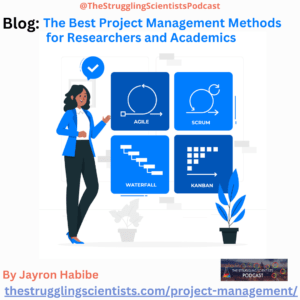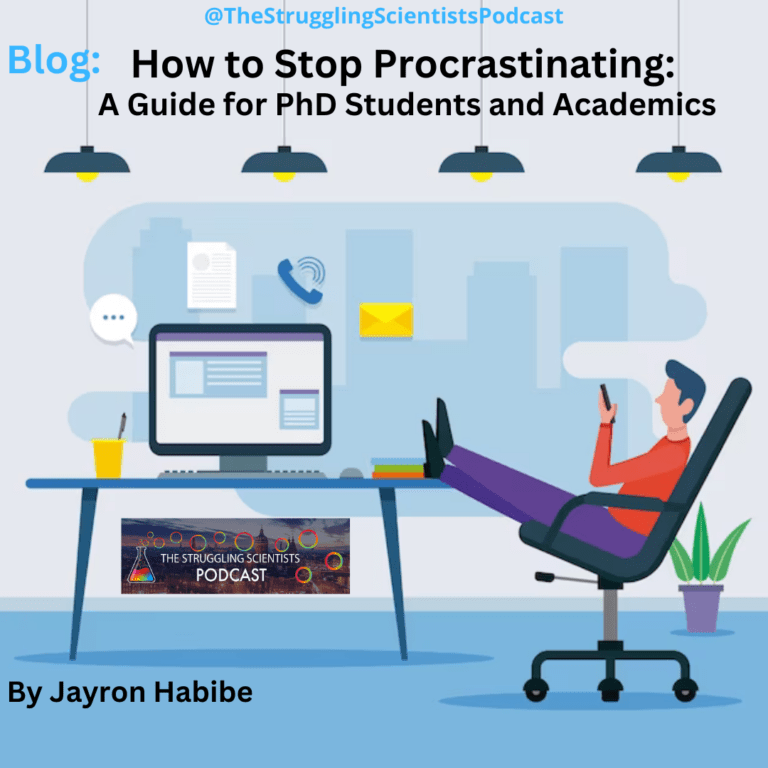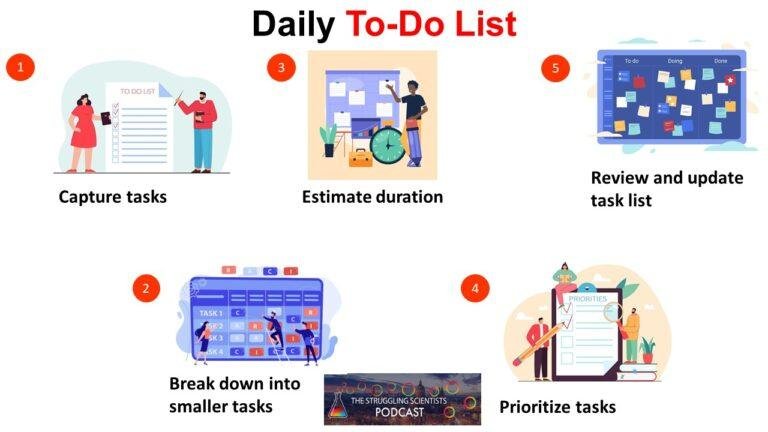🧠Introduction
As a PhD student or academic, you are well aware of the unique challenges that come with managing research projects and meeting deadlines. However, one common hurdle that can hinder your progress is the tendency to start procrastinating.
You may find yourself putting off important tasks, succumbing to distractions, and struggling to make the most of your time. But fear not! This comprehensive guide is specifically designed to help PhD students and academics like you overcome procrastination and maximize productivity.
In the world of academia, productivity is not just a buzzword; it is essential for achieving research goals, making significant contributions to your field, and maintaining a healthy work-life balance. By adopting effective strategies and implementing practical techniques, you can break free from the cycle of procrastination and optimize your productivity, ultimately leading to greater success and personal fulfillment.
Throughout this guide, we will explore a range of proven strategies tailored to the unique needs of PhD students and academics. You will discover how to create a daily to-do list that encompasses research tasks, deadlines, and academic responsibilities. We’ll delve into the power of time blocking and how it can help you allocate dedicated time for research, writing, teaching, and personal development. You’ll also learn how to find your optimal working style, incorporating techniques such as deep work sessions, or collaborative sessions that resonate with your workflow.
Rewarding yourself for research and academic milestones is vital for maintaining motivation, so we’ll explore how to celebrate your achievements along the way. We’ll discuss the importance of minimizing context switching, avoiding distractions, and maintaining focus during crucial work sessions.
By implementing the strategies outlined in this guide, you will not only overcome procrastination but also unlock your full potential as a PhD student or academic. The path to success is paved with intentional, focused, and productive work. Are you ready to stop procrastinating and embark on a journey of enhanced productivity? Let’s dive in and transform your research and academic experience.
🗒️Daily To-Do List for Researchers and Academics
A well-structured and thoughtfully crafted daily to-do list is a powerful tool for PhD students and academics. It provides a roadmap for your day, helping you stay organized, focused, and on track with your research and academic commitments.
It is important to create a to-do list that reflects your priorities and aligns with your long-term goals. Start by capturing all the tasks and responsibilities you need to address, including research activities, writing assignments, teaching duties, meetings, and administrative tasks. Be thorough in this process to ensure nothing falls through the cracks.
Another valuable tip is to break down larger tasks into smaller, actionable steps. This approach helps prevent overwhelm and allows you to make progress incrementally. For instance, if you have a research paper to write, break it down into phases like conducting literature reviews, collecting data, outlining, drafting, and revising. By tackling one step at a time, you’ll feel a sense of accomplishment and stay motivated throughout the process.
Furthermore, assigning realistic time estimates to each task helps you allocate your time effectively and avoid over-committing. This practice ensures that you have a clear understanding of the time required for each task, preventing unnecessary stress and frustration.
Once you have your list of tasks, it’s crucial to prioritize them effectively. Here, you can use the concept of “ABC prioritization,” which involves categorizing tasks into three levels of importance: A, B, and C. A-tasks are high-priority and have a significant impact, B-tasks are important but less urgent, and C-tasks are those that can be deferred or delegated if possible.
To take your prioritization a step further, you can use the Eisenhower Matrix, a productivity framework that classifies tasks into four quadrants: important and urgent, important but not urgent, urgent but not important, and not important or urgent. This matrix helps you identify critical tasks that require immediate attention and separate them from tasks that can be scheduled or eliminated.
Lastly, review and update your to-do list regularly. Priorities may shift, deadlines may change, and new tasks may arise. By taking a few minutes at the beginning or end of each day to review and adjust your to-do list, you ensure that it remains relevant, up-to-date, and aligned with your overall goals.
If you’d like to use an app that makes creating to-do lists super easy I would recommend checking out Todoist. It has tons of awesome features while being extremely easy and simple to just get started with. It also happens to be my to-do list app of choice so if you’re interested just check it out.
⏳Time Blocking for Researchers and Academics
Time blocking is a powerful technique that allows PhD students and academics to optimize their productivity by allocating dedicated blocks of time for specific tasks or activities. By implementing this strategy, you can effectively manage your workload, reduce distractions, and make significant progress in your research and academic endeavors.
Time blocking involves dividing your day into distinct time slots, each dedicated to a specific task or type of activity. This structured approach helps create a sense of focus and clarity, enabling you to prioritize and complete tasks more efficiently. To make the most of time blocking, consider the following techniques:
Identify Your Key Priorities:
Before you begin time blocking, identify your most important priorities. These may include research activities, writing, data analysis, teaching responsibilities, meetings, or personal development. By having a clear understanding of your priorities, you can allocate sufficient time to each area.
Determine Optimal Time Slots
Consider your energy levels, cognitive peaks, and natural rhythms when determining your time slots. Some individuals are more productive in the morning, while others thrive in the afternoon or evening. Find the time slots that work best for you and align them with tasks that require deep focus and concentration.
Block Focus Time
Designate uninterrupted periods for deep work and focused tasks. During these time blocks, eliminate distractions, such as turning off notifications, closing unnecessary tabs, and creating a conducive work environment.
Include Breaks
Recognize the importance of breaks and transition time between tasks. Schedule short breaks to recharge and refresh your mind. Additionally, allocate buffer time between tasks to allow for a smooth transition and avoid feeling rushed or overwhelmed.
Flexibility
While time blocking provides structure, it’s essential to remain flexible. Unexpected events or new tasks may arise, requiring adjustments to your schedule. Embrace the flexibility to rearrange your time blocks when necessary, ensuring that you stay responsive to changing priorities.
Remember, the goal of time blocking is not to fill every minute of your day with tasks. It’s about creating a balance between focused work, breaks, and other essential activities. By allocating specific time slots for each task or responsibility, you gain clarity on your commitments and avoid the pitfalls of multitasking.
Additionally, time blocking can help manage the tendency to overcommit. By allocating realistic time slots for tasks, you gain a better understanding of how much you can accomplish within a given timeframe. This practice prevents the stress and frustration that can arise from unrealistic expectations and allows you to set achievable goals.
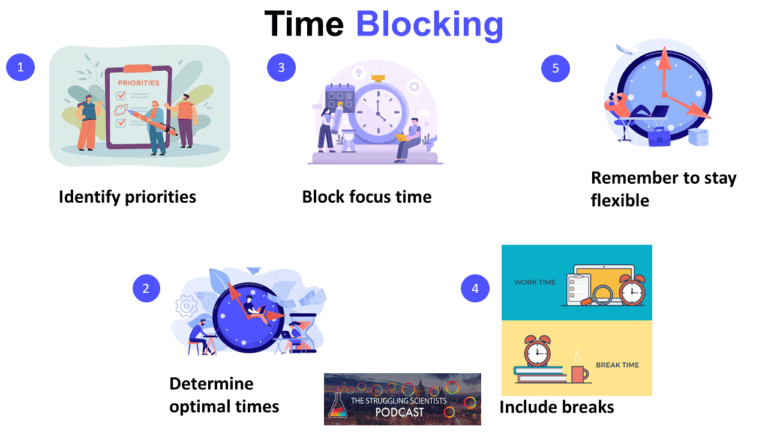
🛠️Discovering Your Optimal Working Style
Finding your optimal working style is crucial for enhancing productivity as a PhD student or academic. Each individual has unique preferences, strengths, and rhythms when it comes to work. By understanding and embracing your working style, you can tailor your approach to research and academic tasks, ultimately boosting your efficiency and output. Here are some key considerations to help you discover your optimal working style:
Experimentation
Don’t be afraid to experiment with different working styles and techniques. Try out various approaches such as the Pomodoro Technique, which involves working in focused sprints followed by short breaks, or deep work sessions where you dedicate uninterrupted time to intensive tasks. Evaluate the outcomes and determine what resonates with you the most.
Collaborative vs. Solitary Work
Consider whether you thrive in collaborative settings or if you perform better working independently. PhD students and academics often engage in team projects or research collaborations, but some tasks may require concentrated solitary work. Finding the right balance that suits your working style is essential for maintaining productivity.
Environmental Factors
Your physical work environment can have a significant impact on your productivity. Some individuals thrive in a quiet and organized space, while others prefer a bustling and interactive setting. Experiment with different environments, and create a workspace that promotes focus and minimizes distractions.
Workflow Tools
Explore productivity tools and technology that align with your working style. Digital tools like project management software, note-taking apps, or reference management systems can streamline your research process. Find tools that enhance your workflow and integrate seamlessly with your working preferences.
Remember, discovering your optimal working style is a continuous journey. As you progress through your academic career, your needs and preferences may evolve. Stay open to adapting and refining your approach to ensure it remains aligned with your goals and aspirations.
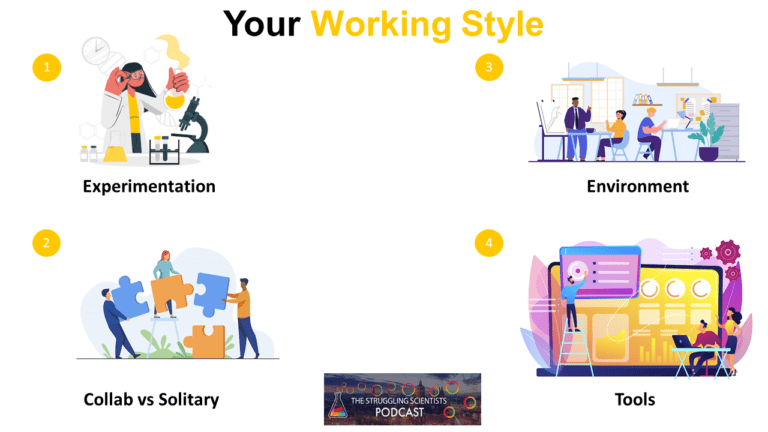
🍬 Rewarding Yourself While Working
Rewarding yourself while working can be a powerful motivator to overcome procrastination and maintain focus as a PhD student or academic. By incorporating intentional rewards into your work routine, you can create a positive reinforcement system that boosts your productivity and enhances your overall satisfaction. Here are some strategies to consider:
Milestone Celebrations
Break down your work into smaller milestones and celebrate each achievement along the way. For example, completing a section of a research paper, reaching a specific word count, or finishing a challenging experiment can all be acknowledged as milestones. Treat yourself to a small reward, such as a coffee break, a short walk, or a few minutes of enjoyable leisure activities.
Time-Based Rewards
Set specific time intervals during your work session, and reward yourself with short breaks or mini-rewards when you reach those intervals. This technique can be particularly effective when using the Pomodoro Technique, where you work for a set period, like 25 minutes, and then take a 5-minute break. Use these breaks to do something you enjoy, like reading a book, listening to music, or engaging in a brief mindfulness exercise.
Meaningful Incentives
Identify rewards that are personally meaningful and aligned with your interests or hobbies. This could be engaging in a favorite recreational activity, treating yourself to a delicious snack, or indulging in a leisurely activity you enjoy. The key is to choose rewards that bring you joy and provide a sense of rejuvenation and fulfillment.
Gamify Your Tasks
Turn your work into a game by setting up challenges or creating a points system. Assign point values to different tasks, and challenge yourself to accumulate a certain number of points within a specific timeframe. When you reach your goal, reward yourself with a prize or treat. This gamification approach adds an element of fun and excitement to your work, making it more engaging and enjoyable.
Social Accountability
Share your goals and progress with a trusted friend, colleague, or mentor. Establish a system of social accountability where you can celebrate your accomplishments together. This external validation and support can be a rewarding experience and provide an additional incentive to stay focused and productive.
Remember, the rewards you choose should be small, enjoyable, and in moderation. The purpose is to create positive associations with your work and maintain a healthy work-life balance. By incorporating rewards into your work routine, you can cultivate a positive mindset, boost your motivation, and reduce the likelihood of procrastination.
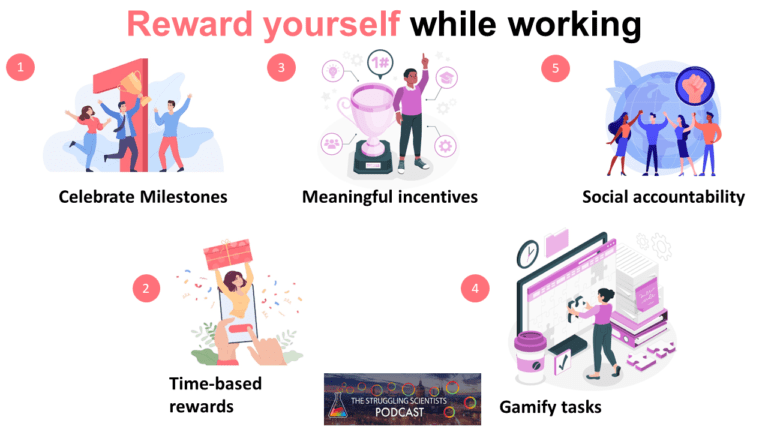
🕹️Avoiding Context Switching
Avoiding context-switching and cultivating mindfulness are essential practices for maximizing productivity and maintaining focus as a PhD student or academic. These strategies help minimize distractions, enhance concentration, and promote a sense of clarity and presence in your work. Here are some tips to minimize context switching:
Batch Similar Tasks
Group similar tasks together and allocate dedicated time blocks for them. For example, schedule a specific block of time for reading and responding to emails, another block for data analysis, and another for writing. By focusing on one type of task at a time, you reduce the need to constantly switch gears and maintain a higher level of efficiency.
Minimize Interruptions
Identify and eliminate sources of interruptions and distractions in your work environment. Silence or disable unnecessary notifications on your devices, inform colleagues or family members about your focused work time, and create boundaries to protect your uninterrupted work blocks.
Plan Transition Time
When switching between tasks or projects, allocate buffer time to mentally transition and prepare for the upcoming task. This allows you to wrap up one task effectively and transition smoothly to the next, minimizing the disruption to your focus and productivity.
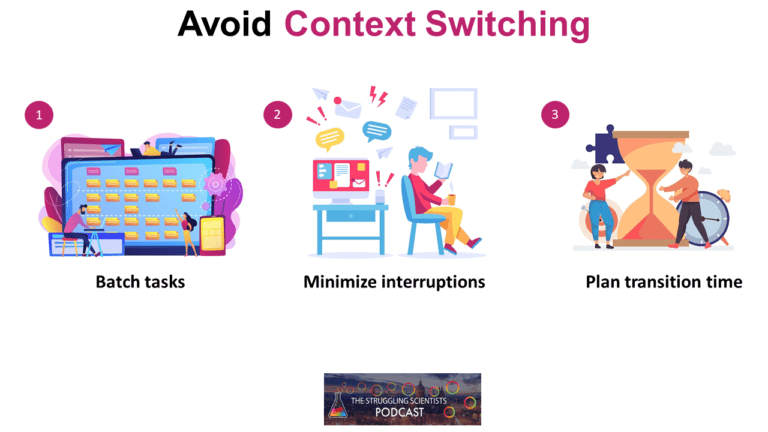
🤯Conclusion
In the fast-paced world of academia, mastering productivity techniques is essential for PhD students and academics to thrive and achieve their goals. By implementing strategies such as creating a well-structured daily to-do list, practicing time blocking, finding what works for you, rewarding yourself while working, and avoiding context switching you can overcome procrastination, maintain focus, and maximize your productivity.
Remember, productivity is not a one-size-fits-all approach. It requires experimentation, self-reflection, and continuous refinement to find the strategies that work best for you as a PhD student or academic. Stay open to exploring new techniques and adapting your workflow as needed. The journey toward productivity is a personal one, and what works for others may not work the same for you.
As you apply these productivity principles, keep in mind the unique challenges and demands of being a PhD student or academic. Embrace your strengths, leverage your resources, and seek support from your peers, mentors, or productivity communities. Together, you can navigate the complexities of academic life and achieve remarkable results.
Ultimately, productivity is not just about getting more things done—it’s about creating a fulfilling and balanced academic experience. By optimizing your workflow, you can allocate time for your research, teaching, personal growth, and self-care. Remember to celebrate your accomplishments, maintain a healthy work-life balance, and prioritize your well-being along the way.
Now, armed with these productivity strategies and a commitment to action, it’s time to embark on your journey towards enhanced productivity as a PhD student or academic. Embrace the opportunities that lie ahead, stay focused on your goals, and make the most of your academic pursuits
Start by implementing one or two strategies from this blog, and gradually incorporate additional techniques into your routine. Remember, small steps can lead to significant improvements over time. Embrace the power of productivity and unleash your full potential as a successful PhD student or academic.



